Bodyguard Kiba, Bodyguard Kiba 2 (1973)
Directed by: Ryûichi Takamori
Written by: Ikki Kajiwara, Kentarô Nakajô, Ryuzo Nakanishi
Starring: Kinji Takinami, Maki Mizuhara, Mari Atsumi, Shin'ichi Chiba, Tsunehiko Watase
BODYGUARD KIBA 1 and 2 [1973]
AVAILABLE ON BLU-RAY: 18th March, from EUREKA ENTERTAINMENT
REVIEWED BY: Dr Lenera
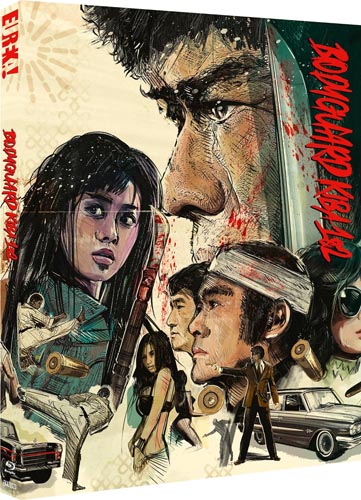
DISC ONE
BODYGUARD KIBA
AKA BODIGADI KIBA, KARATE KIBA
RUNNING TIME: 92 mins / 87 mins [US version]
REVIEWED BY: Dr Lenera
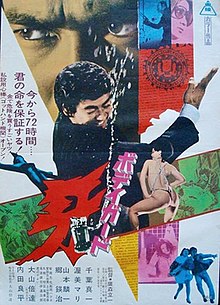
After killing some hijackers who were on the plane he was traveling on, Karate master Naoto Kiba returns to his home in Japan, where he holds a press conference announcing his intention to promote the Tesshin Karate school, which was ran by his master but whose name has seriously gone into disrepute. He also offers his services as a bodyguard to anyone who’s willing to come forward and provide details on the activities of some nefarious drug lords. He’s approached by Reiko Niwa, a rich lady whose Mafia boyfriend hasn’t long been killed and who claims to have important information for him. She wants his protection, and people are indeed after her, but both the Yakuza and the Mafia are interested, and is she really what she appears to be?
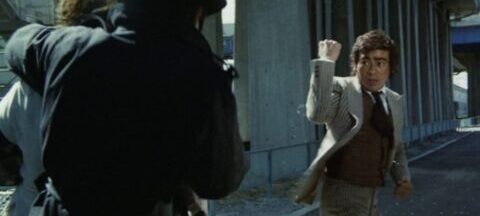
Well I rarely miss an opportunity to mention Quentin Tarantino, the guy [okay Tony Scott directed the film but it’s still known more as being Tarantino’s] who brought Sonny Chiba to a new generation in True Romance. But in the case of Bodyguard Kiba, I probably didn’t even need to mention Tarantino’s name, just recite this quote which became world famous because of a certain movie: “The path of the righteous man and defender is beset on all sides by the iniquity of the selfish and the tyranny of evil men. Blessed is he, who in the name of charity and good will, shepherds the weak through the valley of darkness, for he is truly his brother’s keeper, and the father of lost children. And I will execute great vengeance upon them with furious anger, who poison and destroy my brothers; and they shall know that I am Chiba the Bodyguard when I shall lay my vengeance upon them”. In actual fact the quote is only heard at the start of the American version of this film, which is inferior to the original version though not substantially so. In any case, I’ll again be using the Japanese version as the main basis for this review, but will comment on the US cut further down below. I suppose the next thing to point out is that Bodyguard Kiba is one of the lesser Chiba films out of the ones which Eureka have brought out on Blu-ray in the UK – but then I guess we should have expected the quality to deteriorate eventually, seeing that the company’s deal with Toei has allowed them to release so many of them. There’s a sense of going through the motions in many areas, from the storyline to the action to a slightly bored-looking Chiba himself, and a surprising amount of carelessness in scenes. But of course there are still plenty of nuggets to enjoy, and energetic direction and cinematography by Ryuichi Takamori, Yohio Najakima and Yoshio Nakajima respectively helps immensely, virtually saving the day.
Church bells are heard over the Toei logo before we cut to some people walking out of a church, presumably at a wedding, in what text tells us is New York, May 24th, 1973. Suddenly six guys with machine guns appear to shoot dead most of the others. Audio and newspaper headlines inform that a Don Salbadole Locco has been killed because of a feud over a supply line, by a gang called the Yellow Mafia, and that a Japanese person, who might just hold the key to Locco’s supply route, disappeared just after the incident. Large splotches of blood against white are seen behind the title card, but the rest of the credits appear in Chiba’s introductory scene that happens immediately often, freeze frames interrupting the fun of seeing Chiba cut loose with extreme violent effect. We’re on a plane, and some hijackers belonging to the Black April group are grabbing passengers and demanding money. But one person on the plane doesn’t seem to be paying attention, with his face buried in a newspaper. Of course this is our hero, Chiba getting yet another great introduction as his visage is eventually revealed. A hijacker threatens him with a gun but is told he’ll be killed before he is just that, one flick of his cigarette [not joking] followed by a kick seeming to do it before Kiba moves on to the others, stabbing and punching so that teeth even fall out. Kiba arrives back in Japan where he publicly speaks of doing “much to repair Japan’s reputation in Tel Aviv” because of “commercialism” not “humanitarianism or nationalism”. He may say he wants to be a bodyguard and destroy the underworld, but he admits that it’s all because he wants to restore his master’s style of karate which has gone into disrepute, practitioners being called “bull killers” for reasons we can’t discern, and he displays his skill by chopping a coca cola bottle once with one hand, though what’s really so cool about this is that everything that Kiba says actually refers to Chiba’s real life master Masutatsu Oyama. The training footage that we see even features the real Oyama and his students!
The camera zooms out from a TV to reveal someone watching; this turns out to be Reiko, who’s the first person to ask him for assistance. Kiba’s sister Maki isn’t sure about what Kiba is trying to do, but Reiko is offering fourty million yen for just four day’s work. However, the work immediately becomes dangerous. Maki is attacked outside and it looks like we’re going to get a decent fight involing Yato Watanabe, but then we disappointingly cut to her lying naked with the shadow of a cross looming over her. It’s a nice shot, but what’s happened? She’s been knocked out and had “Cosa Nostra” cut in blood onto her arm, that’s what’s happened. Despite this, Kiba is happy to leave his sister and go out for a drink with Reiko, though this Chiba character doesn’t seem much interested in sex, and doesn’t even drink. That night, in a highly absurd moment, two hoods somehow cut their way into Reiko’s settee before stepping out of from it and going to let their mate in, while somebody is under Reiko’s bed shoving a knife through it in a tense bit. It’s a bit confusing, but it seems that both cops and robbers are here. Kiba shoves an arm through the door and breaks a villain’s arm, then saves Reiko from being tortured for even longer than she actually was by burning shower water. However, it’s soon revealed to us that she has villainous motifs when a “personal guest” arrives. As music plays loudly so Kiba can’t hear, the dialogue exchange takes place: “Why did you hire him”? “I’d be dead if I hadn’t”. The man was once Reiko’s boyfriend, and Reiko apparently, as he tells her, “used to go looking for men in seedy bars when you were 16 years old”. The creepy “love” scene which then takes place increases the implication that he groomed her. They plan to take off with some drugs and also some of their boss’s money, but other factions are also interested in the same thing. And then it all switches to New York.
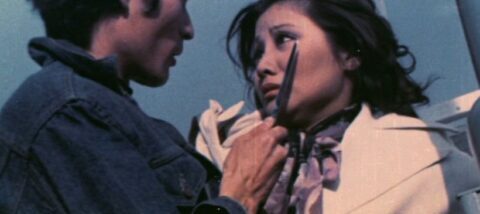
The storytelling is rather disjointed, with probably too much footage taking place in a sleazy bar where Americans, mainly though not entirely GI’s, frequent. It’s owned by the three most prominent bad guys; a prostitute being slapped around, cut with a knife and forced to have sex with a punter seems rather gratuitous though such scenes do tend to make us hate the villains even more so I’m rarely entirely averse to them. The action sometimes suffers from glaring mistakes. For example, if you’re going to try and shoot someone through a doorway as they enter, why on earth would you shoot directly at the doorknob? And just check out the location jumps towards the end, where we start in a shipyard, before being suddenly high above the water on rocky terrain, with no sign of nearby civilization. But then this is also a film where a sign for a New York brothel reads OPEN NOW, PLEASE COME IN SIDE. This was made just before The Streetfighter broke Chiba internationally, and, now having seen a good portion of his notable work during the period thanks to Eureka, one can see that elements of the character he played in that and its two sequels had been building up, these two films marking the final transition. Here, Chiba breaks arms, pierces eyes, breathes bizarrely, and defeats any opponent within a few seconds, though the most miraculous bit is when a severed head [not made that way by Chiba] moves because the actor couldn’t keep still and they couldn’t be bothered to do a retake. Nonetheless Chiba, as he dispatches a fair few bad guys, busts some good moves throughout despite the general lack of actual fights, the latter being especially disappointing seeing how the three brothers Takami, Sigeru and Toru have been built up as major enemies of Kiba, one particular confrontation not happening at all and another stopping, yet they die so quickly. He speaks English as well in a few scenes, though those are more notable for some appalling acting by some American guys playing GIs.
That this is as engrossing as it is is largely down to our afore-mentioned director and cinematographers. There’s a lot of shaky handheld footage, which, as any veteran reader of this website will no doubt know, isn’t something which Doc is too fond of, yet he’ll admit that certain filmmakers from Kenji Fukusaku to Paul Greengrass were able to do it well. Here, we also get a lot of odd angles and character tableau, sometimes reminiscent of Manga, which makes sense considering that Bodyguard Kiba was adapted from a Manga anyway. Our first shot is of glasses on extreme closeup, while much later parts of a carpark are made to look odd and coldly futuristic, but Takamori and Poo also seem to really take advantage of the freedom of a mobile camera, with some great use of whip pans and zooms. The audacious usage of closeups perhaps betrays a Sergio Leone influence, just like a couple of showdown scenes, while slow motion sometimes works and sometimes doesn’t, but at least some style was employed to try to liven up a mediocre outing, and achieved a considerable amount of success in this. In the course of doing all these reviews, I’ve come to the conclusion that Chiba is a pretty decent actor whose thespian skills were rarely properly tapped, but he doesn’t seem sure here, perhaps frustrated by the way his character has a major and very questionable purpose which could have made for something really interesting but which is largely ignored throughout, until it returns in a really rather odd final scene which I can’t work out is intended to be ironic and thought-provoking or not – it makes Kiba out to be a real jerk considering all the carnage that we’ve witnessed – but which will certainly cause the viewer to think. I imagine that Chiba was also disappointed at the way Kiba just carries on protecting Reiko no matter what – we certainly are – but then we have a final scene between the two which is actually rather moving.
There are signs of a much more developed and richer film then the one that we get, yet there’s still the odd bit of richness to latch on to, such as the very layered performance of Mari Atsmi as Reiko; she makes us understand her weakly written character. The music score by Toshiaki Tsushima, while generally very redolent of its era in the most obvious terms, comes into its own and shines when some wordless female vocalising comes along, which adds a likeably strange effect. Bodyguard Kiba will still please many Chiba fans, even if they will have seen much of it all before and done better.
Rating: 









“BODYGUARD KIBA” SPECIAL FEATURES
Brand new feature length audio commentary by action cinema experts Mike Leeder & Arne Venema
This must be the liveliest of all the Leeder and Venema tracks so far [and that’s saying something], with the duo really seeming to be having fun here, talking not just about a film which they consider to be better than I do, but about any vaguely related topic that springs to mind, be it smoking, hijackers who wanted their plane to go to Cuba but there wasn’t enough fuel so they asked for North Korea and were deliberately taken instead to South Korea[!], or Nick Zapetti, a GI who was involved in the black market before opening Tokyo’s first pizza place and sending the Yakuza over to any rival establishment that dared also open. Venema, who tells the last two stories, as well hilariously waxing lyrical about one particularly bad performer, probably says more than Leeder, a feat indeed but one finally achieved. There’s also much chat about Tesshin Karate which we learn is similar to Muay Tai, not to mention an explanation of the “bull killer” line in the film; Oyama apparently had 53 fights with bulls and killed three. Essential!
“The Bodyguard” – alternate US version of “Bodyguard Kiba”
This edition is very different from the original at first, the Ezekiel speech coming up before the credits which play over the footage of Oyama training with his students shown later in the Japanese version, and which are accompanied by Viva Chiba being chanted. Then, following some added shots of New York and the wedding killing, there’s a scene featuring US martial artists Aaron Banks and Bill Louie fighting some students and discussing who’s better; Sonny Chiba or Bruce Lee! And Chiba in this film is playing himself, but we never see him make any movies because he’s too busy fighting crime. The plane scene follows, and actually benefits from not having some shots paused. At the press conference scene, our hero is just interested in busting the drug underworld, with no mention of promoting karate, the words spoken drastically altered in their English translation and mamy others just removed. This also required the removal of the final scene, which isn’t really missed to be honest. The rest of the film is the same, though not very well dubbed.
Talking Chiba – Brand new interview with action choreographer and director Kenji Tanigaki [29 mins]
I’ll start this off with a negative; Tanigaki has quite a thick accent and sometimes it was hard for me to make out what he was saying; some subtitles should have added. Despite this, he’s continually interesting as he discusses, with Venema whom we occasionally hear, how Chiba was very important to him, from seeing him on TV in kage no gundan to finally having him in a film alongside his sensei Yasuaka Kawa, where Chiba told him he was too slow! In fact he often doesn’t want to fight but then gets into it and wants to do everything. I couldn’t make out everything that he was saying about Chiba’s style and impact, though was amused to learn that he was originally billed in the US as Sony Chiba until he complained.
Original theatrical trailer
DISC 2
BODYGUARD KIBA 2
AKA BODIGADO KIBA: SANKAKU TOBI
RUNNING TIME: 88 mins
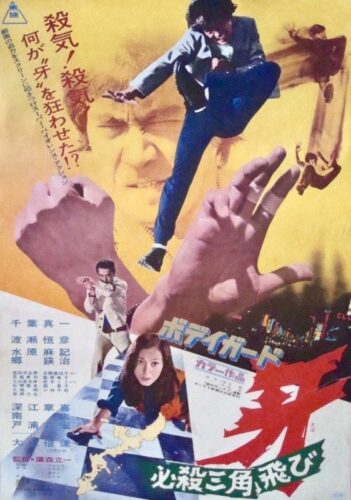
Kiba wins the title at a karate tournament, but the Kikoku-ryu school disputes the victory, leading to an illegal duel which Kiba wins; however, his sister Maki is blinded and Kiba is kicked out of the Tesshinkai Karate school and imprisoned. Upon his release he’s recruited by Akamatsu, the owner of the Nightclub Plaza, to be his personal bodyguard so that he can sever ties with the Yakuza operating as the “protection” in his establishment led by Tatsumi. Tatsumi is insulted and complains to Karasaki, who insists that there’s to be no conflict between him and Akamatsu in order to avoid breaking the promise the three made to each other to conceal a crime they committed years earlier. Amidst all this danger, Kiba develops feelings for an Okinawan singer at the nightclub named Mari….
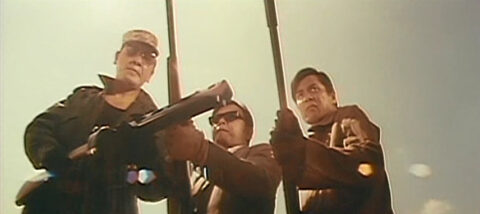
Sonny Chiba’s characters often seem to have a thing about piercing or gouging out the eyes of opponents. In Bodyguard Chiba 2, others do it, and several people plus even a dog are left eyeless and the idea of sight plays a role, notably in the climax. This is one thing which makes this sequel, which reunite screenwriters Ikki Kajiwara and Ryuzo Nakanishi, again adapting a Manga by Kentarô Nakajô, with director Ryûichi Takamori, not to mention bringing back a few other cast members, quite interesting. Another is that it’s the first of his films to feature opponents for Cbiba who seem to be able to properly do martial arts, even though his Japan Action Club had been around for three years. The most notable one here is Chiba’s former teacher Masashi Isbibashi who’d become an opponent for Chiba is several successive films as well as his fight choreographer, and this film also introduced Etsuko Shihomi, who would not just return to play in some later Chiba movies but become a genuine Japanese martial arts star, though the 17-year old doesn’t get to show much of what she could – or maybe she just couldn’t do much yet. Bodyguard Chiba 2 is probably liable to disappoint some Chiba film because there are times when he’s a secondary actor to Tsunehiko Watase as Nanji, and even more times when it seems like he’s about to cut loose but fails to do so; it would maybe have been better if we hand’t been led up the garden path in this way. However, while this might be a minority opinion, I preferred it to the first movie, largely because of its stronger plot and emotional dimension which means that we actually care about at least three of the character. And both the film and Chiba are closer to The Streetfighter, which immediately followed, than ever before.
Two rapid zooms into the face of Tetsugen Daito of the Tesshin Karate school introduce this letter of challenge where a victory won over Ikkan Samejoma of Kokoku School is just not accepted, voiceover telling us its contents. We don’t learn why this victory is been questioned, but in any case we have a time – October the 13th at 9pm – and a place – Bloody Snake Pond. Cut to lightning severing the top half of a tree and then Kiba and Samejoma already about to fight, and this is a pretty memorable fight with which to start the film because of the emphasis on the elements around the combatants, with heavy wind causing the trees and the grass to blow and some strong rain suddenly come in. As with the first fight in the first film, shots are freezeframed to that the credits can appear, but the flow of the action isn’t as interrupted as much and it carries on afterwards. Some cheating takes place with other Kokoku men joining in; Kiba’s sister Maki helps out for a bit but is then held down while Samejoma blinds her, in thw firat of such moments. This makes Kiba jump around and kill his opponent, after which we cut to newspaper headdlines telling us that he refuses legal defense and ended up in prison. and another fight, this time between a few fellow prisoners with spades and pickaxes. Kiba saves a man named Tetsuro Nanjo from getting a pickaxe in the back of his head, then shares his lunch with him after persuading him to actually have some; apparently somebody has been sending him these meals though he’s getting sick of them. They seem to bond, after which we see Kiba just out of prison; along comes a lady to pick him up, but not his sister because she couldn’t make it. The woman tells him to go to an address that night, but he’s lured into the wrong club and is soon sitting at a table with several similar “hostesses” as I think they’re called [paid female company] but only seems to have eyes for the singer who’s performing, Mari, though is warned “don’t try to hit on her”.
Kiba appears rather innocent about certain things, acting surprised when his bill is expensive; there’s almost a fight because of this but then Mari comes along to pay his bill for him. He then leaves to to into the right club, where he’s immediately not welcome for not sticking to the dress code; he knocks down a guy who tries to take his bottle of beer off him, then kicks a cigarette out of another guy’s hand; again it seems like a brawl is about to begin but then the owner, Akamatsu, stops it from happening and welcomes Kiba. He doesn’t want gangsters protecting him any more, but unfortunately but not surprisingly said gangsters aren’t happy at getting the boot, even though Kiba, who’s especially interested when he learns that his potential opponents are Kokoku men, proves that he’s the man for the job by ripping a directory in half. Head bodyguard Tatsumi goes right to his boss Karasaki and complains, but Karasaki doesn’t want any trouble because of a secret crime that he, Tatsumi and enforcer Ryazuka committed one upon a time. Kiba seem to be going sentimental over Mari, but she has a boyfriend, albeit a character we’ve met before who has some connection to the three crooks. The plot gradually reveals all this stuff rather well, keeping the interest high despite the action being held off a bit, and Kiba not even taking part in much of it for some time. It’s rather nice to see a Kiba character actually seem to fall for someone, he and Mari given a surprisingly long dialogue scene where this begins to happen, and rather touching to see that she’s in love with someone else so Kiba actually suffers, something conveyed with subtlety by Chiba, though did we need those slow motion shots of her and her beloved in the sea and on the beach? Anyway, in case you were getting worried, the pace never really slackens and the action does eventually hot up again, along with good characters getting killed alongside bad ones, finally finishing off with a sombre ending that might have been inspired by The Third Man, of all films.
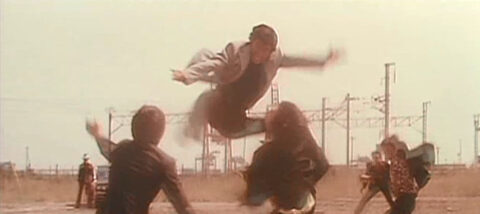
In addition to her boyfriend [whom I won’t name so I don’t spoil the surprise] who’s soon on a revenge mission, and despite being slapped in the face by no less than three characters and on at least one occasion rather unnecessarily, Mari, very well played by Maki Mizuhara, is also an extremely prominent character who ends up taking part in the action, both characters wielding Usugama [an Okinawan weapon like a pickaxe] but only Mari seeming to do it with any skill, and then there’s also Johnny Ujiya the drummer who’s addicted to either weed or heroine [whatever it is, he gets a bit high from just putting the cigarette near his mouth] and the madam who supplies him, both characters also brought into the fray without it seeming too forced. As for Chiba, he’s given the opportunity to play Kiba as more conflicted than before, and a tad darker, even if the script only deals with much of this in borderline superficial terms. But one can see the evolution into his next character, the one that made him an international star, with much more intensity displayed before and as he fights, though a rather excessive use of wirework detracts somewhat. It’s weird to see him engage in a full-on western-style fist fight, but then again it’s possible that the guy that he’s fighting couldn’t do martial arts [even though most others look as if they can] and there’s a cool moment where, behind the men doing battle on a hill by an airport, a plane takes off. Elsewhere, Chiba fights a few opponents several times and the nastiest of the Yakuza, the one who kills the dog [just for barking at him as he walks along], the action occasionally glimpsed just from a distance, the camera lingering as the tiny combatants are dwarfed by their surroundings. Then there’s also a gun battle which is very brief but forms part of a revelatory flashback which is signaled several times earlier by three men running towards the camera in initially extremely slow motion; was Once Upon A Time In The West an inspiration here, or am I making a second connection with another film which is entirely coincidental?
By contrast, there’s a bit more sex than before, from lucky Karasaki having naked girls all over him to a sex scene where we mainly focus on the woman’s pleasure in a rather erotic bit, though there’s also a scene just like in the first one where a prostitute is forced by her pimp to do something that she doesn’t want to do, though it’s less violent. There’s also a rape scene which is actually important to the plot; it has extremely good editing and perhaps the best cinematography of the whole film, with some Noir-like use of bits of darkness in the frame. This is mostly a dark tale, but some light is added by Mari recovering her sight due to her Karate; in fact we wish we saw more of this subplot, but at least it eventually returns, and given an ironic twist though I won’t reveal it, tin the climax, though more could have been done with the potentially rather rousing scene that ensures. The direction by Takamori is again very stylish, perhaps not in quite so many scenes as before which might be due to having a different cinematographer – Yoshikazu Yamazawa – to work with, or a rushed production, yet otherwise there aren’t really signs that this was another of those cash-in sequels hurried out because its predecessor was so popular. It’s generally very professionally pulled off and actually doesn’t contain any of the goofy, careless bits that marred the first time. The handheld magic returns with even more flash zooms, plus an interesting use of freezeframes at the end of important moments, not to mention some flash shots such as images of a rapist when the victim is later thinking about what happened, and lots of low angles looking up.
So, despite much of the original team returning, including composer Toshiaki Tsiuhsima who writes a less in-your-face but more worked out musical score this time, some effort has been made to make this a decent film in its own right, even if its slight attempts to do something different remain constrained by the need to keep to a certain format. There may be less Chiba, but it may also be a slightly better film than Naoto Kiba’s first cinematic outing – which, as I’ve already said, is probably a minority opinion, but I hoped I’ve backed it up fairly well.
Rating: 









“BODYGUARD KIBA 2” SPECIAL FEATURES
Brand new feature length audio commentary by action cinema experts Mike Leeder & Arne Venema
Well at least Leeder ande Venema are in agreement with me that this film is better than the original, something which is perhaps surprising considering that it was released only five months after it! We get even more cool tales than before, from Isbibashi being banned from teaching Tesshin Karate before then being allowed to do so after winning a few fights, to a man who repeatedly broke out of prison and once dislocated both shoulders yet still managed to go through a food dispensary hole and a roof, yet more strange facts about Oyama which I’ll let you learn for yourself. The admiration of these films is pulpable and the duo’s chemistry and sense of humour never suffers; at one point Leeder amusingly describes Venema’s fear of snakes, saying that if he was Indiana Jones, he’d jump off the plane the moment he saw that snake on it!
Kiba or Chiba: Interview with Tom Mes and Jasper Sharp [17 mins]
This may not be the first time that these two experts, fans and contributors to some previous featurettes and commentaries, have been seen in the flesh on these things, but it was a first time for me. They discuss the two films which, Sharp says, were borderline remade as The Streetfighter; in fact he says that most Toei films of the period were very similar. Mes says how Chiba grew into his looks, becoming more gruff and mean-looking, and briefly mentions the three Takeshi Miike Bodyguard Kiba movies; apparently two and three are rubbish. Both men also discuss how real events of the time may have informed the two films. They don’t say which one they think is better, though the first film is talked about more than the second, which might signify something.
Original theatrical trailer
SPECIAL FEATURES
Limited edition O-Card slipcase featuring new artwork by Chris Malbon
1080p presentations of both films across two Blu-ray discs, from new restorations of the original film elements by Toei
As with the Yakuza Wolf outings, Eureka seem to have been using the restorations used in the Region A Shout Factory Chiba set. Both films look like they’ve been meticulously restored, with no visible damage or even blemishes unless you count a few shots which are much grainier than the rest of the film. Colour balance is amazing and there’s so much texture even in all those blacks, browns and greys. Take away the fashions and these films look like they were made ten years ago!
Original Japanese mono audio
Optional English Subtitles
A limited edition collector’s booklet featuring new writing by Jasper Sharp
More Chiba from Eureka, with the commentaries and featurettes providing the usual added value. Not among his best work, but this set still comes Recommended!



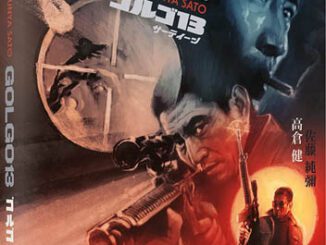
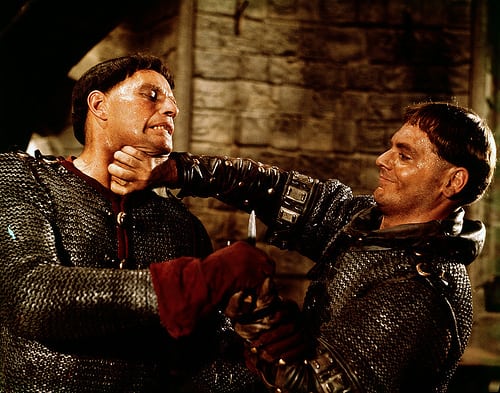
Be the first to comment